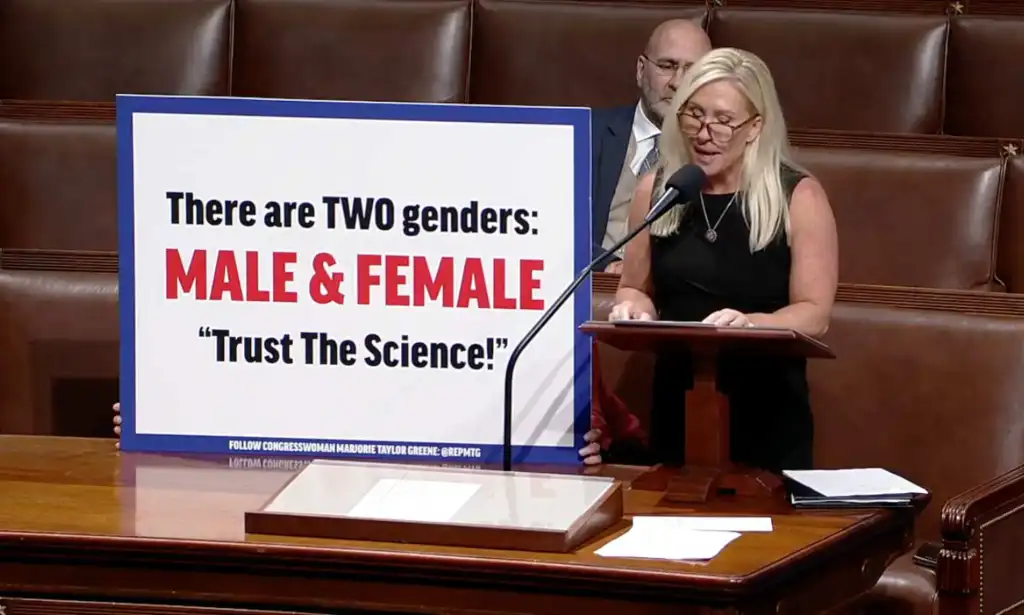Marjorie Taylor Greene’s Hateful House Speech: Disrespectfully Deadnaming and Misgendering Rachel Levine
In recent times, the political landscape has witnessed numerous instances of hateful rhetoric and discriminatory behavior. One such incident occurred during a House speech by Representative Marjorie Taylor Greene, where she disrespectedly deadnamed and misgendered Rachel Levine, an esteemed public servant and transgender woman. This article aims to shed light on the importance of respecting individuals’ gender identities, the consequences of such actions, and the need to foster inclusivity in our society.
It is crucial to recognize that gender identity is an integral part of a person’s identity. Deadnaming refers to the act of using someone’s birth name instead of their chosen name, which can be deeply hurtful for transgender individuals. Similarly, misgendering involves using incorrect pronouns or referring to someone with language that does not align with their gender identity. These actions invalidate an individual’s lived experience and perpetuate discrimination against the transgender community.
Rachel Levine, the target of Marjorie Taylor Greene’s disrespectful speech, is a highly accomplished public servant and a trailblazer in the field of healthcare. She served as Pennsylvania’s Health Secretary before being nominated as Assistant Secretary for Health by President Joe Biden. Levine’s appointment marked a significant milestone as she became the first openly transgender federal official to be confirmed by the U.S. Senate.
Greene’s actions during her House speech not only demonstrated a lack of respect for Rachel Levine but also highlighted a broader issue of transphobia in society. Transgender individuals face disproportionate levels of discrimination, harassment, and violence due to their gender identity. Misgendering and deadnaming contribute to this hostile environment, making it harder for transgender people to live authentically and access equal opportunities.
Sign up for more LGBTQ+ news and updates at TrueQueer.
The consequences of such hateful behavior extend beyond personal harm. When elected officials engage in disrespectful actions like deadnaming and misgendering, they perpetuate a culture of intolerance and exclusion. It sends a message to the general public that it is acceptable to disrespect and deny the identities of transgender individuals. This not only undermines the dignity of those directly affected but also hinders progress towards building an inclusive and accepting society.
To combat this harmful behavior, it is crucial for society as a whole to prioritize education and awareness regarding transgender issues. This includes promoting understanding of gender identity, using correct pronouns, and respecting individuals’ chosen names. By doing so, we can create an environment where transgender individuals are seen, heard, and valued.
Furthermore, it is essential for political leaders to lead by example and advocate for inclusivity. Elected officials have a responsibility to represent all constituents, regardless of their gender identity or any other characteristic. By demonstrating respect and support for transgender individuals, they can help shift the narrative and foster a more inclusive political discourse.
Marjorie Taylor Greene’s hateful House speech, where she disrespectedly deadnamed and misgendered Rachel Levine, serves as a stark reminder of the challenges faced by transgender individuals. It highlights the need for society to prioritize education, awareness, and inclusivity. By respecting individuals’ gender identities, using correct pronouns, and rejecting discriminatory behavior, we can create a more compassionate and accepting world for everyone. It is imperative that we continue to champion the rights of transgender individuals and work towards a future where everyone can live authentically and without fear of discrimination.
Follow us on Facebook
![]()

